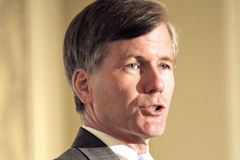 Governor Bob McDonnell announced today that his administration is working on a plan to raise $500 million yearly by 2019 in new transportation revenues to fund roads, bridges, transit and passenger rail.
Governor Bob McDonnell announced today that his administration is working on a plan to raise $500 million yearly by 2019 in new transportation revenues to fund roads, bridges, transit and passenger rail.
He provided no specifics in his keynote address to the 2012 Governor’s Transportation Conference in Tysons Corner but said details would be announced “over the coming weeks.” Said the governor:
My goal for our funding package is to generate at least $500 million in revenues annually by 2019. The new transportation revenues will be dedicated to maintenance, and will eliminate the shortfall which is causing more and more funds meant for construction to be instead spent just maintaining our existing infrastructure. This additional revenue will free up funds for new construction, and will lead to additional funds for transit and passenger rail.
Added McDonnell: “The time to address our transportation funding challenges is now. We cannot continue kicking the can down the road.”
With stagnant transportation revenues and rising maintenance costs, the Virginia Department of Transportation expects to run out of state funds for new road projects by 2017. A broad coalition of cities, counties and chambers of commerce in Virginia’s urban crescent has called for new sources of revenue to bolster transportation spending. And Sen. John Watkins, R-Powhatan, has proposed a tax on the wholesale price of motor fuels sales.
Meanwhile, a coalition of environmental and smart-growth organizations has issued a press release denouncing the McDonnell administration for squandering billions of borrowed dollars on ill-conceived mega-projects, failing to review alternatives and running roughshod over local governments and regional planning organizations. New funding, contended the four organizations, should be tied to reforms in the Public Private Partnership Act, stronger legislative oversight, an active partnership with local and regional leaders, and an objective evaluation of alternative solutions and investments.
— JAB


